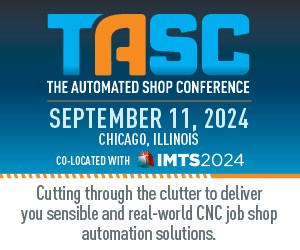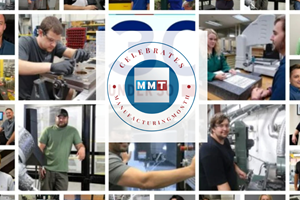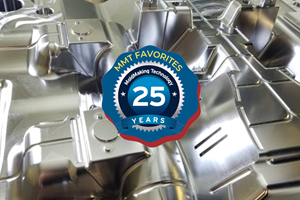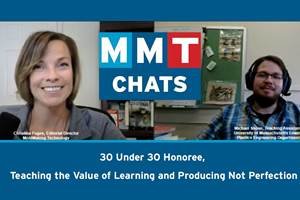Using Automated Technology to Fill the Skills Gap
Process automation is one of the fastest-growing strategies for overcoming capacity constraints in a mold shop.
Demand outpaces capacity for nearly all mold manufacturers in the current market. It’s a good problem to have, but it’s a problem nonetheless. Original equipment manufacturers are diversifying mold designs and introducing on-the-fly engineering changes more frequently, so mold manufacturers must be more agile than ever. These challenges create the perfect storm for missed growth opportunities, particularly when combined with a deficit in skilled labor. Mold and die shops that embrace technology to improve the use of skilled labor, floor space and machinery are those that are best positioned to capitalize on growth opportunities.
The artistry and expertise of seasoned toolmakers heavily influence the capabilities of traditional shops. However, as these veterans exit the market, so too do their valuable skill sets. Machine and process technologies have acquired various degrees of automation, which helps fill the gap. While machine tool principles have not evolved much in the past 40 years, levels of accuracy and reliability have. These changes make it possible for today’s users to rely less on human adjustments and depend instead on machine performance.
Advanced, continuous five-axis machining, for example, provides new levels of efficiency for intricate 3D molds. The technique enables mold shops to reduce cycle times and increase tool life while achieving precision contours with tight blends and matches.
Innovations in accuracy and reliability like these enable automation and unattended manufacturing when a shop’s lights are out, which increase a shop’s use of its capital in turn. Shops that invest in superior technologies enjoy maximized machine-utilization rates while they expand efficiency, improve quality and repeatability and mitigate the need for additional, skilled labor.
To shorten the learning curve both for new and experienced operators, manufacturers should take advantage of modern control systems that feature on-board interactive maintenance guides, training videos and help buttons. Such technology leads to improved machine efficiency and helps a new generation of operators produce parts quickly, reliably and efficiently. Coupled with automation hardware and software, these technologies give shops the ability to increase capacity without adding labor. This gives machinists the freedom to operate multiple machines, load workpieces and perform maintenance.
Process automation is one of the fastest-growing strategies for overcoming capacity constraints. It does not matter if mold shops are performing small mold and die component production, large mold cores and cavities, hard milling or other machining. Automating processes means more than simply adding robotics. First and foremost, automation begins with an understanding of whether the intended machining process is stable enough for the change.
Determining stability entails a detailed analysis of the goals a shop expects to achieve through automation, including the impact on the overall use of the shop. It can be as straightforward as automatically establishing offsets by probing workpieces in the machine or as multifaceted as deploying a fully-automated system with machining, metrology and part-storage systems in one cell.
Enlist an experienced application and engineering services provider to help determine the most appropriate machine tool and automation options. The services provider can help a shop to capitalize on what’s next in moldmaking and raise its competitiveness by overcoming process challenges and increasing the use of its equipment, shop floor and labor.
Related Content
30 Under 30: The New Face of Moldmaking
Young professionals are vital to the moldmaking industry, and it is important to acknowledge those making strides in shaping the industry's future. MoldMaking Technology recognizes the industry's young talent through its inaugural 30-Under-30 Honors Program.
Read MoreICYMI: MMT Chats: True Leadership Leads to Mentoring, Part 1
This trio from TK Mold and Engineering in Romeo, Michigan, joins me to discuss the role of leadership and culture in mentorship. This episode is brought to you by ISCAR with New Ideas for Machining Intelligently.
Read MoreLeading Mold Manufacturers Share Best Practices for Improving Efficiency
Precise Tooling Solutions, X-Cell Tool and Mold, M&M Tool and Mold, Ameritech Die & Mold, and Cavalier Tool & Manufacturing, sit down for a fast-paced Q&A focused on strategies for improving efficiencies across their operations.
Read MoreICYMI, MMT Chats: 30 Under 30 Honoree, Plastics Engineering TA Teaches Value of Learning and Producing Not Perfection
MoldMaking Technology Editorial Director Christina Fuges brings on UMass Lowell Plastics Engineering Teaching Assistant Michael Shone as a guest for this MMT Chat to discuss moldmaking through the lens of academia. This episode is brought to you by ISCAR with New Ideas for Machining Intelligently.
Read MoreRead Next
How to Use Continuing Education to Remain Competitive in Moldmaking
Continued training helps moldmakers make tooling decisions and properly use the latest cutting tool to efficiently machine high-quality molds.
Read MoreAre You a Moldmaker Considering 3D Printing? Consider the 3D Printing Workshop at NPE2024
Presentations will cover 3D printing for mold tooling, material innovation, product development, bridge production and full-scale, high-volume additive manufacturing.
Read MoreReasons to Use Fiber Lasers for Mold Cleaning
Fiber lasers offer a simplicity, speed, control and portability, minimizing mold cleaning risks.
Read More

























